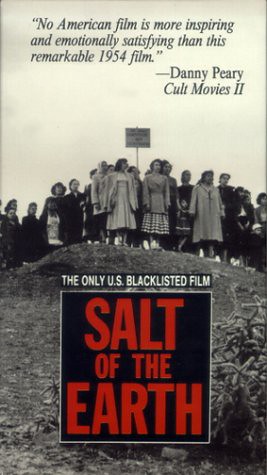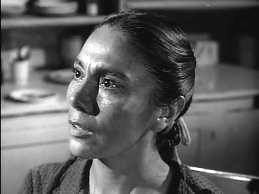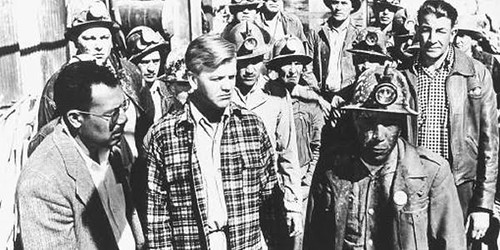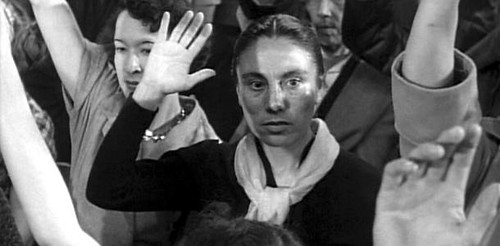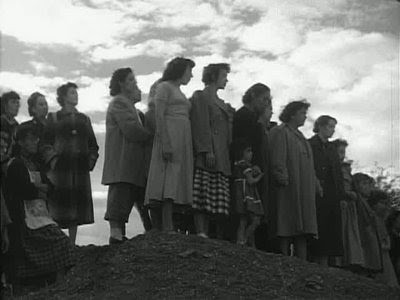SALT OF THE EARTH
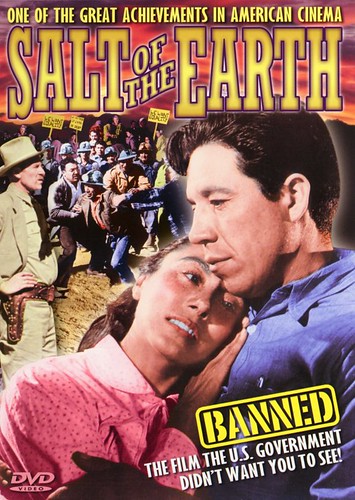
Tagline: The Only Blacklisted American Film
Preshow Entertainment: None
Pizza: None
Once again, I couldn't decide on a punny headline, so please, "grab your pick"!
MINE YOUR OWN BUSINESS
or
ORE THE LAND OF THE FREE
or
MINER LEAGUE
or
MAKE "MINE" ZINC
or
NEW MEXICAN STANDOFF
or
UNLUCKY STRIKE
or
THE COMMIES TAKE A HUAC AT IT
or
ORE THE LAND OF THE FREE
or
MINER LEAGUE
or
MAKE "MINE" ZINC
or
NEW MEXICAN STANDOFF
or
UNLUCKY STRIKE
or
THE COMMIES TAKE A HUAC AT IT
A zinc mine? Really? A film about a zinc mine was the only film banned from being screened...by the United States of America? Sure, we've all seen films that we wished were banned from being screened, but tonight's movie, SALT OF THE EARTH, actually was. There's no sex or violence, so what exactly was it about this 1954 film that made it so forbidden?
A police car heads down a stretch of highway. Inside, the sheriff. In the back, two civilians look around, nervously. The police car makes several turns, maneuvers no driver would make unless they had a reason. In this case, they want to make sure they're not being followed. Confident they're not, the police car makes it to its destination - a church. The men get out and meet with the priest. It seems vigilantes have brought people into town, people whose mission it is to kill these two civilians. But this isn't a scene in the movie. This actually happened in real life. And the two civilians were director Herbert Biberman and his production manager, who are in town shooting the movie SALT OF THE EARTH. What??? Why do people want to kill a filmmaker and production manager? Here's the answer - SALT OF THE EARTH's writer (Michael Wilson), producer (Paul Jarrico), director (Herbert Biberman), composer (Sol Kaplan) and a lead actor (Will Geer) were all blacklisted. Because of ties to communism.
Every generation is scared of something. Now we have Global Warming. Thirty years ago there was Three Mile Island. The 60s had pollution, and from after WWII to the late 50s we had the blacklist. Yet another blemish on a pockmarked face of American ideals, the blacklist was destroying what the country was about by throwing a red scare into the populace (this was also the time "under God" was added to the Pledge of Allegiance). The interesting part was that Communism did indeed have a bit of a hold in America. People surely attended meetings, mostly progressive liberals (damn upstarts), and thanks to our own propaganda machine, we became fearful that the USA would go Red. And movies like SALT OF THE EARTH, in the government's eyes, weren't helping matters.
Because of this, they couldn't shoot in Hollywood. Hell, they couldn't even work in Hollywood. So it was off to New Mexico (the other reason they shot in NM is coming up) to make their movie. When they had to get their film developed, the studios (a/k/a, the government's bitch) sabotaged that as well, even providing letters from Howard Hughes as evidence. Congressman Jackson of the House Committee on Unamerican Activities (soon to be called HUAC) said to congress, "This picture is being made in the state of New Mexico, not far from the Los Alamos proving grounds and, as (journalist) Mr. Reisel points out in his article, 'Where you try to hide secret weapons, you find concentrations of Communists'." This forced the filmmakers to get sneaky and use a fake title when bringing reels to the labs (they also found a willing lab tech). So how perfect is it that this very scenario of studios strong-arming the filmmakers runs parallel with SALT OF THE EARTH's story of a mining company vs. the miners. It's almost as if they were working off the same script.
But hold on folks, there's another layer here. You see, SALT is based on the actual mining strike (Empire Zinc here becomes Delaware Zinc) that occurred in New Mexico only a few years earlier; one where the sheriff locked up women and children, many of whom (ready?) appear here in roles both prominent and background. This movie has subversion written all over it. Some saw (and see) it as a movie about freedom, about America. Others called it Commie propaganda. And not just people around the watercooler, but influential film reviewers like Pauline Kael.
The story starts with women boiling steel tubs of water over homemade fires outdoors. They need the hot water to do their laundry in this largely plumbing-free housing camp owned by the mine. It's all done under brassy patriotic music as the credits display this dedication: "Our scene is New Mexico, land of the free Americans who inspired this film. Home of the brave Americans who played most of its roles." So out of the gate the mission statement is made. We the people, in order to make a more perfect union (in this case, the International Union of Mine Mill and Smelter Workers), are doing so as free Americans, for we are the salt of the earth. We're just a whole lot left of most of you.
Now I'm too dumb and way too lazy to go into Socialism, Marxism and proletarian revolutions here. That's all too bourgeois for me. I will say this, though - SALT OF THE EARTH is one of the most forward thinking movies ever made. There are issues here (Latino and women's rights) that won't surface in the public forum for another decade, at least. And there's even a "They call me MISTER Tibbs" moment 16 years before Sidney Poitier said it. Mr. Alexander (the mine's Super): "That's your name, isn't it? Ray??" Ramon: "My name is Quintero. MISTER Quintero".
Though the picture, like many agenda movies, stands up for something big, it is wisely told through the eyes of a few. It's the story of the Quintero family; husband Ramon (Juan Chacon) and wife Esperanza (Rosaura Revueltas), who leads us through this tale with her voiceover. They live in a town once called San Marcos, but "the Anglos changed the name to Zinctown, New Mexico. U.....S......A." It's a town on land Ramon's grandfather once owned. Ramon has worked in the mine for 18 years. Together, they have two kids and another on the way. It's Esperanza's 35th birthday, and she has baked a cake for herself. But Ramon doesn't even notice it sitting in plain view on the counter. Ramon's got other things on his mind, like that evening's union meeting. Should they strike? For the men, it's an issue of safety (Anglos work in pairs, Mexicans don't), and for the women, who were mostly voiceless in this era and culture, it's an issue of sanitation, like bathrooms and hot running water (the Anglos have this as well). But really, it's all about the dignity of hard working, salt of the earth people, righteous people, like Ramon, who when Esperanza thinks he remembered her birthday, confesses that their son Luis reminded him. And like the mine itself, they're caught between a rock and lots of other rocks, because as Ramon says, "...if we lose, we lose more than the strike. We lose the unions. If we win, we win...hope. Hope for our kids."
Their decision becomes clearer when, after a miner is injured, the boss gives his callous "I see no reason to treat the occasion like a paid holiday" speech. The workers shut down. The gears stop gearing. The money machine grinds to a halt. And the struggles begin. Company vs. Miner. Sheriff vs. Union. Husband vs. Wife. Striker vs. Scab. There's no shortage of conflicts here. Days go by. Weeks. The company won't negotiate. They're waiting them out. They have other mines. But leader Ramon and the others weather it out, surviving injustices like getting beaten up by cops, presented here with dramatic cross-cutting between Esperanza's birthing (which no company doctor would assist in because of the strike). And when they come to repossess Esperanza's radio, it's almost as if they are repossessing Ramon's soul.
Before they know it, six months have gone by without negotiations. Union rations are drying up. Some workers must leave due to hardship (not Ramon and Esperanza, they only have three kids) to find work elsewhere. And then the company hits their coffin with another smelted nail. They've managed to get a court injunction demanding that the miners either go back to work or get arrested. And that's when it gets interesting. That's when the women speak up. At first they're laughed at, but once the men realize they have no choice, the majority agrees. At first the men, already bruised, won't hear of it. They even laugh. But as time ticks on, pragmatism leads to humility. So within the external mine vs. miner infrangible conflict lives a more intangible one which finds the men hanging laundry, yelling at the kids and complaining about having no hot running water while the women walk the line. And this ain't no HONEYMOONERS or LUCY episode. This is ripping families apart, ripping friends apart. Ripping a husband and wife apart. Can these men, with their buckets of pride, give in? So the women work the picket lines, circumventing the injunction. Anyway, some of the women and their children(!) wind up in jail. Now remember, this is a true story, so - wow. This movie isn't even thinly veiled. In fact, the veil here is invisible, witness the scene where an Hispanic friend-turned-scab finger-points at the striking women's ringleaders - literally.
In 1954 America there were 13,000 movie theaters, 13 of which ran SALT OF THE EARTH. That's not very surprising given its backstory. But this part is - that same year another film was released, also about unions and the worker's (some also playing themselves) violent struggle. In this movie, also based on a real story, the workers were dockworkers. And while SALT had its own formidable struggle to simply get made and barely released, ON THE WATERFRONT won 8 Academy Awards. Why? Besides WATERFRONT being anti-union, it's also widely believed it was because director Elia Kazan and writer Budd Schulberg named names, while Biberman & Co. did not. SIDE NOTE: Naming names also killed Kazan's friendship with Arthur Miller (among others), who was an original writer on WATERFRONT, backing out when he was asked to make the bad guys Commies.
Getting SALT released wasn't the end of their problems. Lead actress Revueltas was labeled communist and deported back to Mexico. She had to do the voiceovers for SALT in Mexico and have the tapes smuggled back into the country. Even making SALT was a problem. Non-pro actor Clinton Jencks, who just about played himself, found his car full of bullet holes. Another time during filming, a mob trying to stop the shoot gave Jencks a black eye. At one point, someone torched one of the non-pro actor's houses. Threats were common, and police were called in to prevent disturbances.
Sure, SALT OF THE EARTH has its flaws, like some of the non-pro actors stink (Ruth is teeeeeeerible), and it's often oddly paced and too raw, and for sure, Esperanza's summational voiceover at the end is corny, preachy and maybe a little too on-the-nose (those Commies really wanted you to know that they were American Commies). But it is without a doubt an interesting and important movie, one steeped in the history of not just filmmaking, but of our country. Knowing its background before the movie screened, I was pretty sure we'd all be in for a movie whose importance outweighed the movie itself. But that's only a little true. I was fascinated by SALT, and I think you will be too. It's on DVD, and because no one bothered to renew the copyright, it's public domain. That means you can watch it, in segments, on YouTube. Take that, you Capitalist pigs!!
